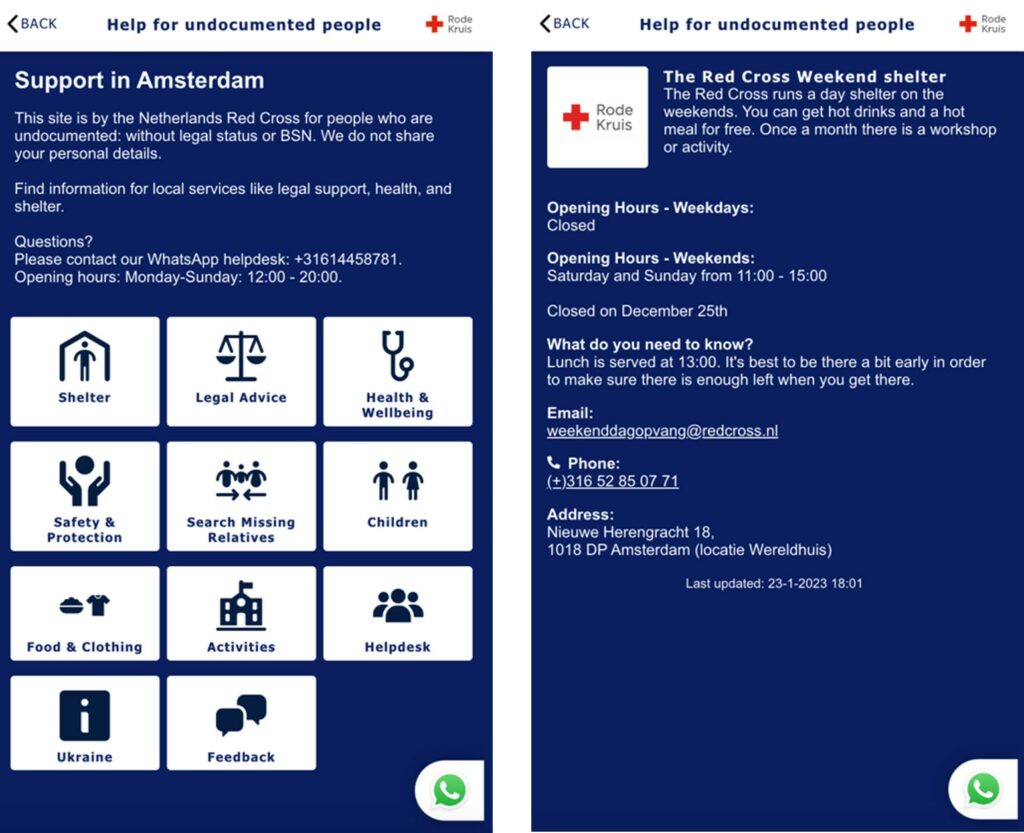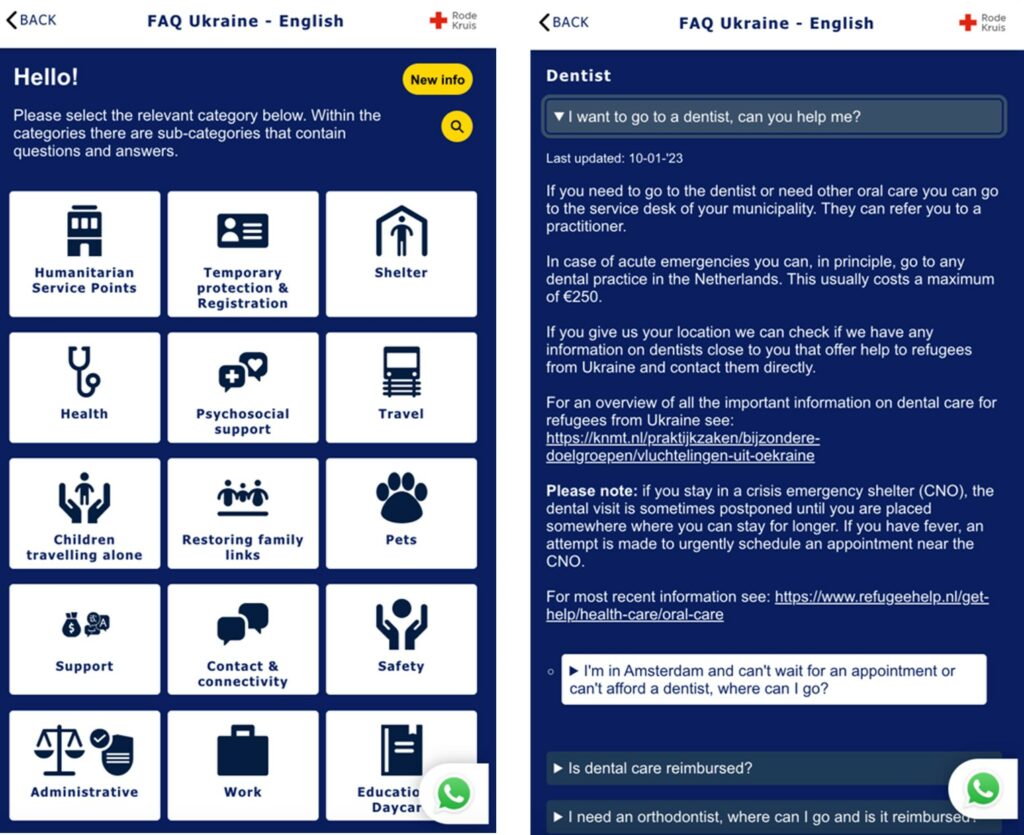Les migrations et les déplacements constituent l'un des plus grands défis humanitaires de notre époque. À la fin de l'année 2022, 108,4 millions de personnes dans le monde ont été déplacées de force as a result of ongoing and new conflicts. The International Federation of Red Cross and Red Crescent Societies (IFRC) supports people on the move, with a focus on saving lives and preventing suffering. In 2019, the Netherlands Red Cross, together with their data and digital initiative 510, a développé le Application web d'informations utiles (HIA)) afin de fournir aux migrants et aux réfugiés, ainsi qu'à ceux qui leur viennent en aide, des informations facilement accessibles.
“With HIA, the Netherlands Red Cross informs undocumented migrants about local aid offerings. The strength of HIA is that it is very easy to put and maintain information on the website. This makes it possible to collaborate with local branches, where they keep track of the information.”
Carry van Wersch, program lead supporting undocumented migrants – The Netherlands Red Cross
L'EIS est actuellement utilisée dans le cadre de 6 projets dans 4 pays, fournissant toujours des informations pertinentes pour le groupe cible spécifique et le contexte du programme. Cela peut aller de la localisation des points de services humanitaires et des informations sur les droits fondamentaux, à des instructions sur la façon d'accéder à l'assistance médicale et au soutien psychosocial, ainsi qu'à des conseils juridiques. L'EIS peut également aider les travailleurs humanitaires en contact avec les personnes touchées, en affichant une liste de questions fréquemment posées (FAQ) régulièrement mise à jour.
Developed through Human-Centred Design – with and for users
HIA est le résultat direct de la co-conception et des tests d'utilisateurs avec les sans-papiers vivant aux Pays-Bas. Leur expérience, leurs connaissances et leurs besoins ont été au cœur de la conception de cette application web, une méthodologie appelée Conception centrée sur l'homme which stresses the importance of involving the human perspective in the product creation process. Many undocumented migrants have told us that they are very selective with downloading applications and that this is why they would prefer a website over an app. We’ve learned that this is because they often lack storage space on their phone, which is because they use the cheaper and older models that they are able to afford. They’ve also told us that most of the time, they rely on the free WiFi that is provided in the day and night shelters where they are temporarily staying. These WiFi connections are usually shared with many others, making it difficult to load images, videos and interactive content. We have built the web-app with these real-life experiences in mind, for example by making it as lightweight as possible. With this way of working, 510 strives to ensure that any digital solution that we offer is user-friendly and practical.
L'EIS aux Pays-Bas
Décembre 2019 : EIS pour les sans-papiers aux Pays-Bas
‘Il y avait déjà beaucoup de soutien disponible aux Pays-Bas, mais il n'était pas toujours facile de le trouver. L'IHA a proposé une solution.’ says Anne van Berkel, former project manager at the Netherlands Red Cross. In this first version of HIA, undocumented migrants can access the web app by simply googling for information, or through a QR-code which is shown on posters and business cards at places they frequently visit, such as local day shelters like the Worldhouse. On the landing page, they can choose the city that they are in or closest to and obtain an overview of the local support that is available to them there. Behind the scenes, Netherlands Red Cross focal points in the districts as well as in the main office in the Hague keep this information up to date, in direct correspondence with the local organisations that provide the support. Since the start, this version of HIA has had an average of around 4.000 visits per month.

Instance en direct de l'EIS pour les sans-papiers aux Pays-Bas
Mai 2020 : EIS pour les migrants (sans papiers) affectés par Covid-19 aux Pays-Bas
Lorsque la pandémie de Covid-19 a frappé les Pays-Bas et juste avant le pic des restrictions et des fermetures, nous avons contacté un groupe d'(anciens) sans-papiers que nous connaissions grâce aux sessions de co-conception que nous avions organisées pour l'EIS en 2019. Nous leur avons demandé comment ils allaient, et si et comment leurs besoins avaient évolué à cause de Covid-19. Sur la base de ces informations et d'autres données et recherches, nous avons conçu le projet Aide numérique directe avec laquelle la Croix-Rouge néerlandaise a apporté son soutien autour de trois piliers numériques : un bon d'achat numérique dans un supermarché, un service d'assistance WhatsApp et l'EIS. Pour l'EIS, cela signifie que nous avons commencé à ajouter des informations sur Covid-19 et les restrictions dans différentes langues, en répondant aux questions que les gens se posaient, par exemple sur la règle de la distance de 1,5 m et s'il était dangereux de partager les mêmes appareils de cuisine dans les abris où ils étaient hébergés. Plus tard, lorsque les vaccins sont devenus disponibles, nous avons commencé à ajouter des informations sur les lieux de vaccination et avons répondu aux préoccupations et aux questions des gens, par exemple sur la nécessité de présenter une pièce d'identité pour se faire vacciner et sur la crainte de ne plus être sous le radar des autorités. Au cours de ces mois, cette version de l'EIS a enregistré une moyenne d'environ 6 000 visites par mois.
Mars 2022 : EIS pour les travailleurs humanitaires en contact avec les réfugiés d'Ukraine arrivant aux Pays-Bas
When the Netherlands Red Cross started responding to the large-scale population movement resulting from the escalation of the conflict in Ukraine, a WhatsApp helpline a phone based information line and three Humanitarian Service Points were set up to assist refugees from Ukraine who were arriving in the Netherlands. With the large number of staff and volunteers involved across these different channels and locations, and with the government still designing the policies and processes to be put in place, it was difficult to make sure everyone had access to the right and up to date information. Co-design sessions with the focal points from the different engagement channels showed a clear need for one information hub that could centralize answers to the most frequently asked questions, avoiding the risk of their team members working with downloaded or printed, and therefore outdated, PDF or Word documents. Here, the original HIA served as a base to develop the HIA – FAQ. In a slightly different format, now with a drop-down button with an answer for each question, instead of the local organizations providing support, the web app reveals the most relevant information and its source, for example a government website. This ensured easy access to updated and reliable information for the aid workers, who could then communicate this to the refugees from Ukraine through the various engagement channels and locations. Since the start, this version of HIA has had an average of around 3.100 visits per month.

HIA – frequently asked questions (Ukraine)
Septembre 2022 : EIS pour les travailleurs humanitaires en contact avec des personnes en procédure d'asile aux Pays-Bas
Au milieu centres d'asile débordés Aux Pays-Bas, la Croix-Rouge néerlandaise a lancé un programme d'hébergement dans le cadre duquel elle gère des centres d'hébergement dans tout le pays en collaboration avec les municipalités et l'Agence centrale pour l'accueil des demandeurs d'asile (COA). Les travailleurs humanitaires de la Croix-Rouge gèrent, conseillent et soutiennent les sites, tout en offrant une oreille attentive, un soutien psychosocial et en organisant les activités quotidiennes. Des sessions préliminaires de co-conception ont montré que le personnel et les bénévoles travaillant dans ces centres d'hébergement recevaient de plus en plus de questions, par exemple sur la procédure d'asile, et qu'ils avaient du mal à trouver les bonnes informations pour fournir une réponse qui aiderait réellement les personnes qui s'y trouvaient. C'est pourquoi, en septembre 2022, nous avons ajouté à HIA les informations pertinentes pour ce programme d'hébergement et pour les travailleurs humanitaires en contact avec les migrants et les réfugiés arrivant aux Pays-Bas et qui naviguent dans les procédures d'asile. Ces informations garantissent que tous les travailleurs humanitaires travaillant dans les centres d'hébergement ont accès à des informations actualisées, concises et facilement accessibles qu'ils peuvent partager en réponse à des questions. Cette version de l'EIS est également utilisée pour l'intégration des nouveaux travailleurs humanitaires dans les centres d'hébergement, afin qu'ils en apprennent davantage sur les étapes de la procédure d'asile et sur les droits fondamentaux des réfugiés aux Pays-Bas. De plus, cette version de l'EIS est également utilisée par le service d'assistance WhatsApp de la Croix-Rouge néerlandaise pour répondre aux questions des personnes dans le cadre de la procédure d'asile normale. Depuis son lancement, cette version a reçu en moyenne 800 visites par mois
Prochaines étapes
While HIA was first introduced in 2019 to assist undocumented migrants in the Netherlands, since then, it has evolved into a centralized knowledge platform available for people on the move, (migrants, refugees and IDP’s), as well as aid workers in direct contact with them. Beyond the Netherlands, HIA is now also being used in Hungary, Kyrgyzstan and Jordan. New instances can be set up within a day when there is a need for centralized information related to a new program or emergency. We are constantly improving HIA by doing user tests with the different target groups and are also starting to scale the product by working with more and more National Societies.
Nous voulons vous entendre !
Vous souhaitez collaborer avec nous sur des solutions similaires dans le domaine de l'engagement et de la responsabilité des communautés, adaptées à votre contexte ? N'hésitez pas à nous contacter :
Conseillerou, Engagement et responsabilité de la communauté: Jonath Lijftogt jlijftogt@redcross.nl
Responsable du programme d'aide aux sans-papiers : Carry van Wersch cvanwersch@redcross.nl